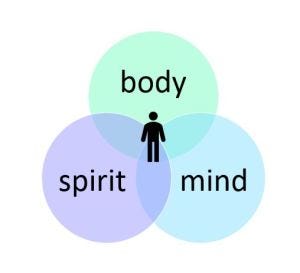
Holistic Health Integrating Mind, Body, and Spirit for Total Well-Being
With the rate at which we live, the idea of health is often nothing more than physical fitness these days. Holistic health, however, does not necessarily take such an approach, maintaining that real wellness goes beyond the physical, it’s the mind, body, and spirit. Through this integrative, balance and harmony is promoted to a life that is fulfilling. Holistic health is based on these principles and in this article, I want to show you how to create a daily routine that reflects those principles.
Understanding Holistic Health
There are some holistic health ideas that all aspects of a person’s life are interconnected. Clearly, physical health is important but it’s not the only thing. Overall, mental and emotional health are also a very important part in your well-being. From our immune system to our energy levels, holistic health knows that stress, negative thoughts and emotional disturbances can take a physical toll.
The goal of holistic health is to achieve balance among these three components:
Mind: It includes mental clarity, emotional stability and psychological well being. An underlying healthy mind is a critical condition for the health of the mind, and for sane, decisions, reducing stress and a fulfilling life.
Body: All these contribute to physical health. It should be concentrated on a proper and healthy living for the sake of fulfilling the body’s needs.
Spirit: Spiritual health is how we perceive of purpose, our values, and connection to something bigger than ourselves. It might take the form of religion, meditation practice, or even personal growth practice.
The Benefits of Holistic Health
Embracing a holistic approach to health offers numerous benefits:
Enhanced Well-Being: Basically, if people feel better in all aspects of health then they will feel better overall. However, all this may actually help you feel better — better mood, more energy, less stress and more optimistic view of life.
Reduced Stress: All of these holistic practices like mindfulness, yoga and meditation can do wonders to reduce stress and help us relax, and find balance.
Increased Resilience: An holistic approach makes people learn better tools to tackle life’s challenges and face life’s adversities, making them a resilient and adaptable person.
Improved Relationships: In focusing on its holistic health, people intuitively tend to get in touch with their emotions and needs, which makes for healthier, happier relationships.
Preventative Care: Holistic health is the preventative approach to health. For improving chronic illness risk and promoting longevity, the mind, body, and spirit should be nourished.
Also, check Mental Health Matters Strategies for a Balanced Mind
Practical Ways to Integrate Holistic Health
Getting holistic health into your daily routine doesn’t require a lot of work. Here are some practical steps to get started:
1. Mindfulness and Meditation
Practice of mindfulness begins from the day. Sit in meditation for a few minutes and then set the intention for the day and observe your breath. This is a practice that will help create mental clarity and emotional stability.
2. Balanced Nutrition
Eating a diet brimming with wholesome foods. Fruit, vegetables, lean protein and healthy fats. Through mindful eating—being conscious of what you are eating and how it feels—this can bring you closer to your body.
3. Regular Physical Activity
Take time outside to feed your spirit. Being out in nature is taken in and it kind of makes you feel grounded and connected. You don’t need to take a hike in a wood, or walk in a park, it can just be time to appreciate the natural world.
4. Connect with Nature
So whether that be yoga, dancing, walking or strength training, do whatever you love to do, and do it everyday as part of regular exercise. Not only does being active help you keep physically fit but it will release your bodies endorphins more commonly know as your feel good hormones and add that little extra zap.
5. Foster Relationships
Make connections with friends and family. Support one another, experience the good of listening and sharing. It is very important for emotional and spiritual well being to have healthy relationship.
6. Continuous Learning and Growth
Read books, go to workshops, engage in spiritual activities. Lifelong learning is life enhancers, add to a sense of purpose.
Conclusion
The idea of holistic health is a powerful concept for treating wellness as a wholistic endeavor that sees how the mind and body are intertwined, much like the spirit. When you’re able to weave these pieces through your own life, you’re able to create a layer or depth of balance and resilience and fulfillment. Let’s embark on the path to whole health, and begin today on a journey to a more healthy, more harmonious existence.
